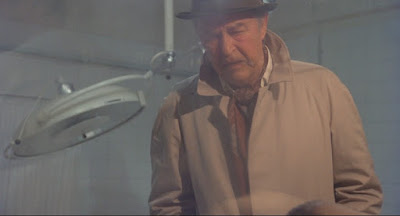The Pyjama Girl Case (La ragazza dal pigiama giallo) is an intriguing 1977 Italian crime thriller that one could be tempted to label as a giallo. I don’t think it is a giallo. I don’t think it can even be regarded as an unconventional giallo. It’s a murder mystery combined with a police procedural. There’s not enough action to qualify it as poliziottesco. I think you could make a perfectly plausible case for regarding this movie as a neo-noir. It combines murder and sex, but in a way that strikes me as much more typical of the neo-noir than the giallo.
The movie is based on possibly the most famous murder case in Australian history. In 1934 a young woman’s body was found, clad in yellow pyjamas. At first the victim could not be identified. It took ten years to identify the woman and solve the case, although some doubts still remain. It was a media sensation at the time and in 1977 when this movie was made there were still plenty of people in Australia who remembered the pyjama girl case.
The movie changes some crucial details but the core of the story – the difficulty of identification and the fact that the girl’s body was put on public display in the hope that someone would identify it is based on historical fact.
This is an Italian movie but a lot of location shooting was done in Australia.
The movie begins with the discovery of a young woman’s body on a Sydney beach. The body had been doused in gasoline and set alight and the face is unidentifiable.
Homicide cop Inspector Timpson (Ray Milland) is retired but manages to get permission to assist in the investigation, much to the disgust of the officer officially in charge of the case.
The police have few clues. There are a couple of pieces of suggestive evidence but they are open to misinterpretation by the police, and by the viewer. There’s another clue so trivial that no-one but Inspector Timpson is even interested in it, but it’s the key to the mystery.
Ray Milland looks old but he’s supposed to be a crusty irascible old guy and he’s still Ray Milland and he’s as watchable as ever. He really is excellent.
Dalila Di Lazzaro makes an effective female lead. Mel Ferrer is excellent as an eminent but lecherous doctor.
Director-writer Flavio Mogherini didn’t have a huge career as a director and didn’t seem to do much else in the crime genre. This is not just an interesting movie but an interestingly constructed movie so it is perhaps a pity he didn’t do more films of this type. The structure is not just daring – it’s superbly executed.
The location shooting goes a bit overboard on Sydney tourist landmarks but on the whole it uses Sydney very effectively as a setting. It’s a beautifully shot movie.
Moving the time period from the 1930s to the 1970s works just fine. In 1977 the difficulty of identification and the lack of certain types of forensic evidence that would today be taken for granted would still have seemed plausible. I love the fact that the decision was made to retain Australia as the setting. The story would have worked in a different setting but the Australian setting gives it a distinctive feel.
The movie takes an extremely interesting and daring narrative approach. The nature of the narrative makes it incredibly difficult to talk about without risking spoilers. This movie really is better appreciated if you go into it knowing as little as possible about the plot so I’m going to dispense entirely with any discussion of the plot.
To be honest I’m not sure that any other narrative approach would have worked.
The pyjama girl’s story involves a lot of the elements that I would see as typically neo-noir – sexual betrayal, jealousy, suspicion. This movie does not feel at all like a giallo but it does feel somewhat like a precursor to later movies like Body Heat and Basic Instinct, and possibly even the 1981 The Postman Always Rings Twice. The Pyjama Girl Case has that same kind of tragic doom feel, with sex being the instrument of doom.
I’m not suggesting that Mogherini was consciously making a neo-noir but I suspect he was doing what a number of Hollywood directors were doing in the 70s, 80s and 90s (starting with Chinatown in 1974) – taking classic film noir as a starting point and taking advantage of the fact that they could now deal much more openly with the dark side of sexual desire. To me the two central characters are very much noir protagonists – they’re a mixture of good and bad and they’re spiralling down into the noir nightmare world and they can’t stop themselves. I also think that in Sydney in 1977 has much more of a neo-noir vibe than a giallo vibe.
The Pyjama Girl Case has its own flavour and it works extremely well. Very highly recommended.
The Pyjama Girl Case is included in Arrow’s Giallo Essentials Red Blu-Ray boxed set. The transfer is excellent and there are quite a few extras.




